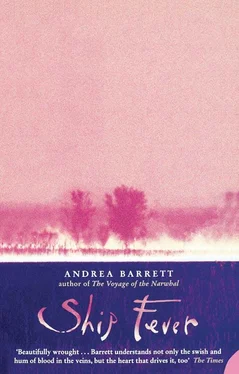Mrs. Heagerty made a sour face and picked up the first pair of lamps. “And his generous wife.”
On an evening two weeks later, the only lamps lit at Lauchlin’s house were in the kitchen, where he had no place, and in his crowded office. He shared this house with his father in theory, but in fact his father was not around for more than a few weeks a year. In his absence, Lauchlin had let go all the servants but one housemaid and the housekeeper and the housekeeper’s nephew, who slept in the stables and did part-time duty as gardener and groom. Lauchlin could hear them laughing downstairs, by the warm range.
His room was cold. He sat on the floor, in front of the fire, with a glass of Bordeaux beside him and a plate of food congealing on the arm of his chair. Slowly, meticulously, he pried the top from a large crate and began to unpack the shipment of books he’d been awaiting all winter. Henle’s General Anatomy, which he handled reverently and then set on the shelf beside his earlier work, On Miasmata and Contagion. Chadwick’s Sanitary Report, which he placed next to Southwood Smith’s Treatise on Fever. Thick books bound in smooth calfskin, containing knowledge he’d begun to think he would never use.
In Paris, where he’d studied with the famous Dr. Pierre Louis, he had learned to be suspicious of excessive blood-letting and over-zealous purgation and to seek scientific explanations for disease. He had learned percussion and auscultation and how to use a watch with a second hand for the counting of the pulse. In Paris human dissection was legal; he had not had to rely on demonstrations but had explored scores of bodies himself. Here, though — here the doctors were old-fashioned, even ignorant. Although they’d admitted him to the Quebec Medical Society, no one agreed with his methods and no one sent patients his way. His research had yielded nothing so far and his practice was dead. He might be better employed doing almost anything.
Susannah’s right, he thought. I’m useless. Still stinging from her sharp tongue, he’d called a few days after their argument on his father’s old friend, Dr. Perrault, and mentioned his desire to find some way of combining his interests in research and preventive medicine with patient care. To his surprise Dr. Perrault had responded enthusiastically, although he hadn’t had an immediate solution.
“Public health,” Dr. Perrault had said. “It’s the emerging field — think about Mathew Carey’s study of yellow fever in Philadelphia. Or Dr. Panum’s handling of the measles epidemic last year in the Faroe Islands. In his report he proved beyond doubt the efficacy of quarantine and the fact that measles is not miasmatic but purely contagious in character. The most rigorous, mathematical epidemiology and investigation of underlying cause, combined with patient care and social policy — good science combined with good medicine. Or so it seems to me. You might keep your eyes open to opportunities here for similar work. It’s a shame to waste your kind of training.”
The conversation had sent him back to his books and, even more than Susannah’s apparent scorn, had made him think perhaps he should reconsider his direction. He had not gone to see Susannah these past two weeks; no more evenings playing cribbage, no long talks over tea. Since their argument he had felt himself to be a scuttling little creature: a rodent, say. Or a louse. His desk was piled with unpaid bills and he’d have to draw on his father’s account again. The house needed repairs, after this long harsh winter. Gutters needed patching, stonework repointing, the shrubberies were a mess; workmen had to be organized and plans drawn up. He had more than enough time to attend to all this, but the idea filled him with an overwhelming boredom. Surely, surely, this was not how he was meant to spend his life.
He finished shelving his new books and then methodically broke the crate into kindling and stacked the pieces beside the fire. Nothing to do now but face the mail. Bills, a heap of medical journals, some of them from the States; a letter from Bill Gerhard in Philadelphia and one from a Dr. Douglas.
He opened the letter from Gerhard first: the usual list of triumphs and enthusiasms. In Paris, Gerhard had already been established as Dr. Louis’s prize student when Lauchlin arrived, and they’d overlapped just long enough to establish a friendship. Since his return to the States, Gerhard seemed to have done everything that Lauchlin wished he’d done himself. An appointment at the prestigious Pennsylvania Hospital; an enormous practice; an investigation into epidemic fevers that resulted in a series of brilliant papers in which he differentiated typhus and typhoid in terms of their distinctive lesions.
Increasingly I lean toward the theories of Henle, Gerhard wrote, after giving the news of his family. These fevers must be due to some sort of pathogenic microbes; and not, as the miasmatists contend, to noxious exhalations given off by filth. But I have to admit I have had no success in finding these microorganisms.
Lauchlin skimmed the rest of the letter and then put it down, feeling very tired. His twenty-eighth birthday had passed without anyone noticing it but him; perhaps, as Gerhard had once suggested, he should have settled in New York or Philadelphia upon his return from Paris, instead of coming here. He almost burned the other letter unread. A request for money from one of the newly founded medical schools, or an invitation to a dinner honoring a colleague he did not respect; he could not bear one more reminder of his failure to make his mark in this city.
But it was just possible that the letter was a referral, and so he slit the envelope.
May 2, 1847
Grosse Isle Quarantine Station
Dear Dr. Grant:
Dr. Perrault has been in touch with me, about your recent inquiry into the possibility of entering the field of public health. I am writing to ask if you might consider assisting me here at the Quarantine Station for the summer months. Every evidence suggests that the coming migration from Ireland will be extraordinarily large this year. We have news that vast numbers of emigrants began leaving Ireland in February, and I believe we may expect them here within a few weeks, now that the ice has finally cleared from the St. Lawrence.
No doubt you have read in the newspapers the various expressions of alarm by the citizens of Quebec and Montreal. Their alarm is justified, I believe. And likely you are also aware of the recent harsh legislation in the United States, which will almost surely have the effect of turning the bulk of the emigration toward us. However, I have not so far succeeded in convincing Buchanan of the probable seriousness of the situation. I have been granted hardly a tenth of the money I requested for preparations. Nonetheless, I have been empowered to hire several physicians to assist me.
Dr. Perrault has recommended you most warmly, and I pray, if your own business is not too pressing, that you consider joining this important effort. If you can see your way to doing this, I could use you at your earliest convenience. Our small steamer, the St. George, arrives at the King’s wharf on Fridays for supplies, departing Saturday, and is available to convey you. Please let me know your decision as soon as possible.
Yours sincerely,
Dr. George Douglas [II.]
The island looked like this at first: low and verdant and beautiful, covered with turf and trees. The shrubs growing down to the water’s edge were mirrored in the St. Lawrence, so calm that day that the island seemed to hang suspended above a shadowy version of itself. A huge white porpoise rose, disturbing the silver surface, and gulls dove and then emerged with fish writhing in their beaks. As the St. George steamed past the coast, Lauchlin saw a series of miniature bays, craggy and appealing. Toward the island’s center, where the ground rose, were stands of large trees and a white steepled church. None of these conventional beauties eased the knot in his chest.
Читать дальше
Конец ознакомительного отрывка
Купить книгу












